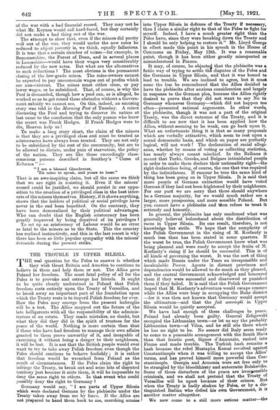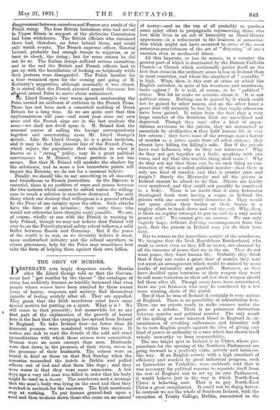THE TROUBLE IN UPPER SILESIA. T HE real question for the
Poles to answer is whether they wish Great Britain and America to continue to believe in them and help them or not. The Allies gave Poland her freedom. The most fatal policy of all for the Poles is to provoke and estrange her friends. It ought to be quite clearly understood in Poland that Polish freedom rests entirely upon the Treaty of Versailles, and to break away an important part of the foundation upon which the Treaty rests is to imperil Polish freedom for ever. How the Poles may emerge from the present imbroglio will be a test. The Allies mapped out the future of the late belligerents with all the responsibility of the adminis- trators of an estate. They made mistakes, no doubt, but what they did they did in the spirit of trustees for the peace of the world. Nothing is more certain than that if those who have had freedom to manage their own affairs granted to them prove unworthy of it, and incapable of exercising it without being a danger to their neighbours, it will be lost. It is not that the British people would ever want to try to take away Polish freedom even though the Poles should continue to behave foolishly ; it is rather that freedom would be wrenched from Poland as the result of circumstances. If the Poles claim the right to infringe the Treaty, to break out and seize bits of disputed territory just because it suits them, it will be impossible to deny the same right to others. In that event who could possibly deny the right to Germany ?
Germany would say, " I see parts of Upper Silesia which were declared German by the plebiscite under the Treaty taken away from me by force. If the Allies are not prepared to hand them back to me, marching armies into Upper Silesia in defence of the Treaty if necessary, then I claim a similar right to that of the Poles to fight for myself. Indeed, I have a much greater right than the Poles have, since they were breaking down the Treaty and I should be only helping to restore it." Mr. Lloyd George in effect made this point in his speech in the House of Commons on Friday, May 13th. It was a reasonable point, though it has been either greatly misreported or misunderstood in France.
It may, of course, be objected that the plebiscite was a futile way of trying to settle thb disputes of the Poles and the Germans in Upper Silesia, and that it was bound to lead to trouble. We are inclined to agree, but it must none the less be remembered that the Allies decided to have the plebiscite after anxious consideration and largely in response to the German plea, because the Allies rightly desired to prove that they did not want to say No to Germany whenever Germany—which did not happen too often—presented .rational arguments. In other words, the plebiscite, though it was not a part of the original Treaty, was the direct outcome of the Treaty, and it is difficult to see now that it has been applied how the Allies, without seeming to be weak, can go back upon it. What an unfortunate thing it is that so many proposals which are verbally attractive, which seem to rest upon a sound democratic basis, and which on paper are perfectly logical, will not work ! The declaration of racial allegi- ance, whether by means of voting or collecting statistics, has nearly always meant mischief. In the Balkans it meant that Turks, Greeks, and Bulgars intimidated people in order to make them declare their nationality right—the right declaration being, of course, the one that was required by the intimidators. If rumour be true the same kind of thing has been going on in Upper Silesia. It is said that more people of German extraction would have voted German if they had not been frightened by their neighbours. For our part we are sorry that there should anywhere be a German majority, for we would much rather see a larger, more prosperous, and more sensible Poland. But you. cannot have a plebisoite and then refuse to treat it seriously and honestly. In general, the plebiscite has only confirmed what was generally believed beforehand about the distribution of races in Upper Silesia. Its one result, therefore, is not knowledge but strife. We hope that the complicity of the Polish Government in the rising of M. Korfanty is much leas than has been stated in some quarters. If the worst be true, the Polish Government knew what was being planned and were ready to accept the fruits of M. Korfanty's rising if he should be successful. This is of all kinds of governing the worst. It was the sort of thing which made Russia under the Tsars an irresponsible and incalculable Power. Agents in distant provinces and dependencies would be allowed to do much as they pleased, and the central Government acknowledged and honoured them if they were successful and disavowed or punished them if they failed. It is said that the Polish Government hoped that M. Korfanty's adventure would escape censure while the Allies were busy in occupying the Ruhr district —for it was then not known that Germany would accept the ultimatum—and that the fait accompli in Upper Silesia would be quietly accepted. We have had enough of these challenges to peace. Poland had already been guilty. General Zeligowski occupied the Lithuanian town—or let us say the probably Lithuanian town—of Vilna, and he still sits there where he has no right to be. No sooner did Italy seem ready to come to a peaceable arrangement with the South Slays than that frantic poet, Signor d'Annnnzio, rushed into Fiume and made trouble. The Turkish hash remains a hash because the rebel Mustapha Kemal revolted against Constantinople when it was willing to accept the Allies' terms, and has proved himself more powerful than Con- stantinople. Georgia and Armenia were set free only to be strangled by the bloodthirsty and autocratic Bolsheviks. Some of these disturbers of the peace are irresponsible criminals, and we shall not pretend that the Treaty of Versailles will be upset because of their crimes. But when the Treaty is badly shaken by Poles, or by a dis- tinguished Italian who defied his own Government, it is another matter altogether. We now come to a still more serious matter—the disagreementbetween ourselves and France as a result of the Polish rising. The four British battalions who had served in Upper Silesia in support of the plebiscite Commission bad been withdrawn. The British officials who remained there had, therefore, no force behind them, and could only watch events. The French supreme officer, General Lerond, probably had enough troops to suppress, or at least to check, the rising ; but for some reason he did not do so. The Italian troops suffered serious casualties, and in the end the British and French officers had to put up with the humiliation of looking on helplessly while their protests were disregirded. The Polish frontier for a time remained open for the coming and going of M. Korfanty's supporters, although nominally it was closed. It is stated that the French arrested armed Germans but siled armed Poles to move about unhindered. Mr. Lloyd George's very warm speech condemning the Poles caused an outburst of criticism in the French Press.
There has not been such a concerted scolding of Great Britain for a long time. As we are quite sure that this unpleasantness will pass—and must pass since our own aims and the French aims are . in the last analysis the same—we shall not dwell upon it. M. Briand took the unusual course of calling the foreign correspondents together and commenting upon Mr. Lloyd George's speech. Like Mr. Lloyd George, he is a great tactician, and it may be that the present line of the French Press, which enjoys the popularity that attaches to what is known as a " strong " policy, may be a great political convenience to M. Briand, whose position is not too secure. But that M. Briand will mistake the shadow for the substance, and to score a few immediate points will impair the Entente, we do not for a moment believe.
Finally, we should like to say something in all sincerity and friendliness to French journalists. As the Entente is essential, there is no problem of ways and means between the two nations which cannot be solved unless the willing- ness to reach a solution is somehow destroyed. The only thing which can destroy that willingness is a general attack by the Press of one country upon the other. Such attacks have the force of an invasion ; they unite those who would not otherwise have thought unity possible. We are, of course, wholly at one with the French in wanting to help Poland, though we may not believe that Poland will ever be,-as the French physical safety school believes, a solid buffer between Russia and Germany. But if the peace of the world is to rest, as we devoutly believe it must, upon undisturbed industry and the refusal anywhere to create grievances, help for the Poles may sometimes best take the form of helping them against their own follies.



































 Previous page
Previous page